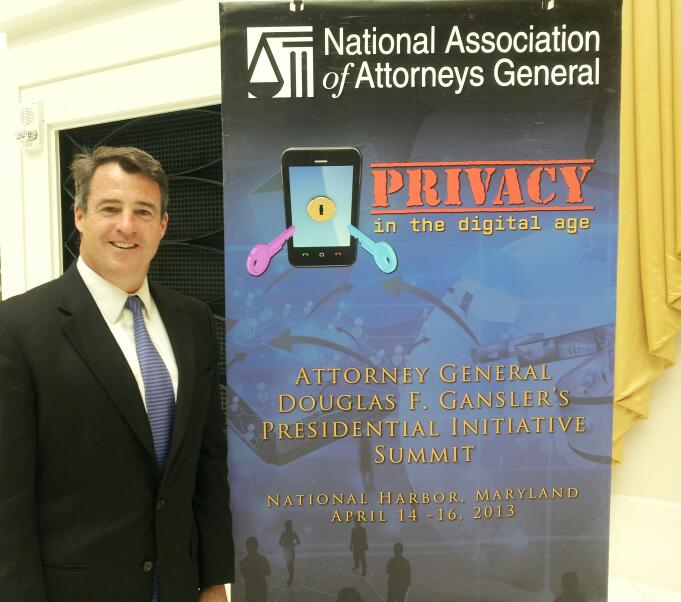Attorneys general team up with Facebook to protect privacy
By Becca Heller
Led by Maryland Attorney General Doug Gansler, the National Association of Attorney Generals (NAAG) has teamed up with Facebook to improve social media security with the launch of a new consumer education program.
Issues of social media privacy were featured at a NAAG cybersecurity summit this week, alongside the topics of financial hacking and government infrastructure.
“Just as we must address bullying, harmful content and other dangers in our schools and in our neighborhoods, we must address them online,” said Gansler, president of NAAG, on April 15 during the introduction of the summit.
Facebook a focal point
Facebook has been a focal point for Gansler, who is spearheading the NAAG-Facebook partnership and advocating for better distribution of privacy information to teens. The summit took place at the Gaylord National Resort and Conference Center in National Harbor on the Potomac River..
“The problem is there are ever-changing privacy policies and privacy protections, and the kids aren’t always aware of the changes — and certainly parents aren’t always aware of the changes,” explained Gansler. “And a lot of times, the things people post on Facebook can affect what colleges they get in to, what kind of scholarships they get, and even their careers.”
With this concern in mind, Facebook and NAAG came to an agreement that will help attorney generals provide information on privacy and social media safety. The public service announcements will be posted on Facebook in place of advertisements and will be distributed by attorneys general on a state level, directing parents and teenagers to a “privacy policy kit.”
Representatives of Facebook said they were excited to be working with NAAG to improve its users’ understanding of privacy and Internet safety. They see it as an opportunity to build user-trust and improve the social community, they said.
“We understand that if people don’t trust our service, then they’re not going to share information with one another,” said Erin Egan, chief privacy officer at Facebook. “And if they don’t share information, then we’re not going to fulfill our mission of connecting the world.”
Critic blames data arms race among Internet giants
On the same panel with Egan was Jim Steyer, CEO of Common Sense Media and an outspoken critic of Facebook. Steyer agreed that the partnership between NAAG and Facebook was good for corporate accountability and consumer education, but he said he strongly believes that Facebook’s decisions are driven by its business model.
“What we have right now is a data arms race going on between some of the larger media companies in the country,” said Steyer, referring to Facebook and its competitors. “When you have a data arms race that is core to the national economy and the business models of those companies, you’re going to have enormous issues around privacy, particularly as it relates to kids and teens.”
Egan assured the audience that Facebook views teen safety as a priority, detailed some of the technical measures they take to protect teens, and explained that various teams are dedicated to moderating content and developing privacy policies.
“There’s nothing more important than kids and teens on our site,” said Egan. “We want to make sure that the Internet is an appropriate place for teens.”
Steyer said that he felt that the attorney generals had the power to make the web a safer place for kids, but called for the government to hold the industry more accountable for providing technological solutions for teens and parents.
“What we have in Silicon Valley is a lot of twenty-somethings who don’t have kids, who are trying to create the coolest things for teens as possible. They aren’t thinking about kids’ safety,” said Steyer. “The sooner that Mark Zuckerburg has kids, the better it will be for the rest of us.”

MarylandReporter.com is a daily news website produced by journalists committed to making state government as open, transparent, accountable and responsive as possible – in deed, not just in promise. We believe the people who pay for this government are entitled to have their money spent in an efficient and effective way, and that they are entitled to keep as much of their hard-earned dollars as they possibly can.



